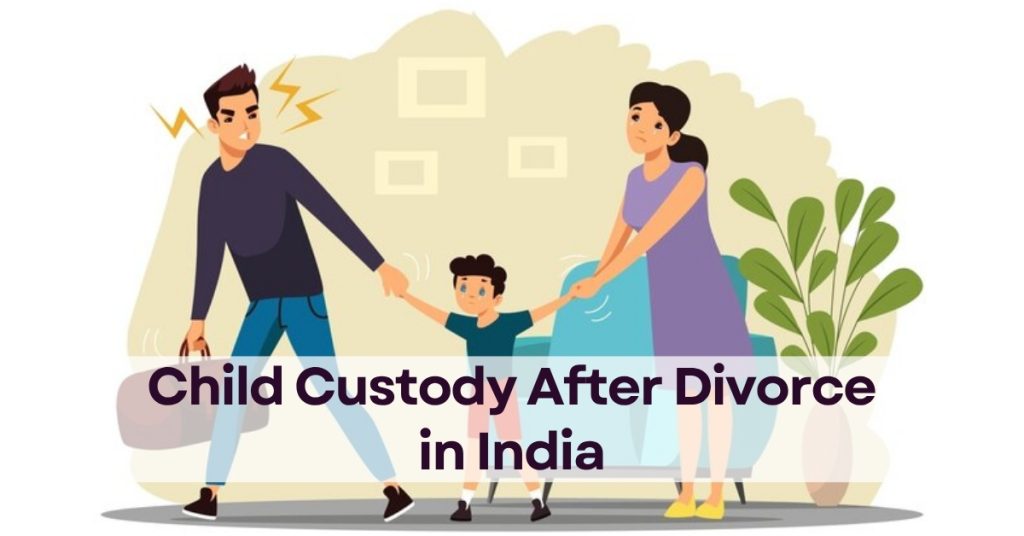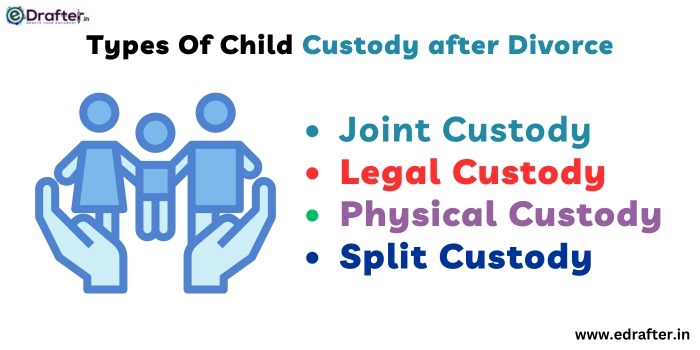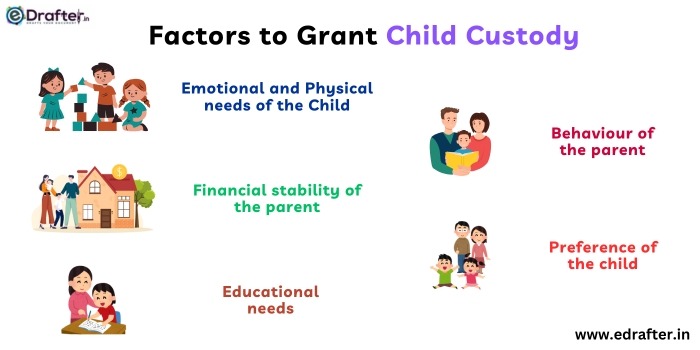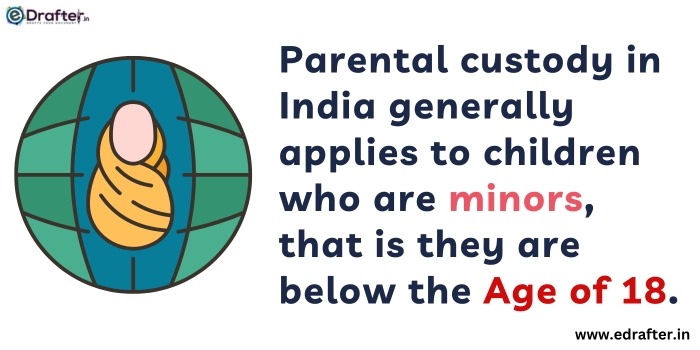
Table Of Content
- What Laws Govern Child Custody in India?
- How many Types of Child Custody after Divorce in India are there?
- What is the difference between Legal Custody and Physical Custody?
- What are the Factors to Grant Child Custody?
- When can Custody be given to a non-parent?
- When can the Court take away Custody?
- How to get Child Custody and Divorce Advice online?
- At what age can a Father get Custody of his Child in India?
- Till what age do Parents get the Custody of their Child?
- What are the Challenges Faced in Child Custody Cases?
- Conclusion
Child custody after divorce in India is the most crucial aspect of divorce proceedings. Custody refers to the care and guardianship rights of a parent to raise a minor child after the separation of parents after divorce. It determines which parents or guardians will have the authority to raise the child until they are of legal age. Legal custody of a child after divorce ensures the well-being, safety, and security of a child to ensure they are living in a healthy environment.
What Laws Govern Child Custody in India?
After divorce child custody laws in India are governed by personal laws based on religion. Further, delving deeper into these laws:
- Under Hindu Marriage Act, 1955 the provisions for child custody are covered under the Hindu Minority and Guardianship Act, 1956.
- The Islamic Law (Hizanat) applies to custody-related cases in Muslim laws wherein generally the mother has the right to custody unless disqualified by the law. Usually, mothers have child custody after divorce in India, until they reach the age of 7 for boys, whereas the girl child custody after divorce is given to her mother until she attains the age of 9 years.
- The Christian law does not have any specific provision for child custody, rather the Indian Divorce Act, 1869 deals with the matters relating to child custody.
- Parsi couples who seek divorce, their matters for child custody are dealt with under the Guardians and Wards Act, 1890 along with the Parsi Marriage and Divorce Act, 1936 which allows the court to pass temporary orders governing custody.
How many Types of Child Custody after Divorce in India are there?

The courts in India may grant different types of custody for the welfare of the child, depending upon the circumstances. The different types of custody are:
- Joint Custody– Under this, both the parents share the responsibility, and the child gets to spend equal time with each parent.
- Legal Custody– Legal custody of a child after divorce suggests that one parent gets the authority to make legal decisions about the child’s life like education, healthcare etc.
- Physical Custody– When a parent is given physical custody, it means that the child will live with one and the other has visitation rights, as per the orders of the court.
- Split Custody– In some arrangements, custody of one child may be granted to one parent while the custody of another is given to the other parent.
Also Read – Legal Notice For Divorce
What is the difference between Legal Custody and Physical Custody?
Physical custody and legal custody are two distinct concepts related to the care and responsibility of a child. They both define different aspects of the relationship between parent and child and the terms often come up in decisions made by court regarding child custody.
| PHYSICAL CUSTODY | LEGAL CUSTODY |
| Physical custody of a child after divorce refers to the parent with whom the child will live on a day-to-day basis. | Legal custody of a child after divorce refers to the right to make important decisions in the child’s life. |
| This type of custody determines where the child physically resides and provides for the child’s daily needs like shelter, clothes, food, and general care. | This gives a parent the right to make long-term decisions that affect the child’s life, like education, healthcare, religion, and the child’s general welfare. |
| Determine which parent the child primarily lies with. | Determines which parent has authority over significant life decisions. |
Also Read; Rights of Wife after Divorce in India
What are the Factors to Grant Child Custody?
The welfare of the child is of utmost importance when it comes to granting custody to a parent. It differs from case to case and thus there are a few factors that the court may consider while providing custody:

- The emotional and physical needs of the child
- Financial stability of the parent
- Educational needs
- Behaviour of the parent
- Preference of the child
Note: Custody of the child is given to the mother until she is deemed unfit by the court until the child reaches the age of 5, as per the Hindu Laws.
Also Read; Can I Get Divorce Without Going To Court In India?
When can Custody be given to a non-parent?
It is not always the scenario that a parent will only be given legal custody of child after divorce in India. If the court finds that both parents are incompetent and unfit to raise their child, the custody can be transferred to a third party which is often a close relative or grandparents. Also, if a child has always lived with grandparents and as per the preference of the child, the grandparents will be given custody in the best interest of the minor.
When can the Court take away Custody?
The court can transfer custody when the well-being of the child is being hampered, as the order for custody is not permanent and can be changed for the betterment of the child. Any of the close relatives or the other parent who does not have guardianship can ask for it when they are concerned about the well-being of the child, or they feel that the safety and security are being jeopardized.
Also Read; Divorce Rules
How to get Child Custody and Divorce Advice online?
Getting child custody and divorce advice online in India requires finding trustworthy sources, experts, and platforms that provide relevant legal guidance. Some steps which you can follow are:
- Consult legal websites and portals
- Connecting to family and law firms
- Online legal consultation and legal blogs
- Approaching legal aid services
At what age can a Father get Custody of his Child in India?
Child custody is given to the mother only until the child reaches the age of 5, but in special circumstances where the mother is unfit for the same, the father can get custody as well. However, after the age of 5, the court will assess various factors such as the child’s needs and the parents’ ability to provide financial and emotional support.
Till what age do Parents get the Custody of their Child?

The parental custody in India generally applies to children who are minors, that is they are below the age of 18. Once the child turns 18, the court considers them to be an adult who can make their life decisions.
However, when the child reaches adulthood at 18 there can be situations where custody-like arrangements continue or where parents remain involved in certain decisions.
- Children with special needs
- Legal dependency where a child is still dependent on parents, financially and emotionally. E.g.: college years. But this is not considered “custody” in a legal sense, it is more about parental responsibility and support.
What are the Challenges Faced in Child Custody Cases?
While the proceedings of divorce and child custody can be troublesome, the challenges after the divorce can create complications such as:
- Lack of adequate family support as co-parenting is often difficult.
- While the parents bear the financial cost, the child goes through emotional stress caused by the proceedings of divorce and child custody.
- Societal pressure often worsens the existing conditions of the family.
Conclusion
Child custody decisions are complex and emotional as they decide the future of a child. A balanced approach that prioritizes a child’s needs and wants is essential to ensure proper growth and development of the child.

